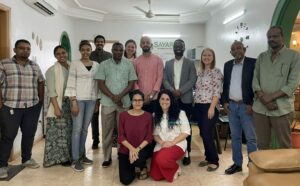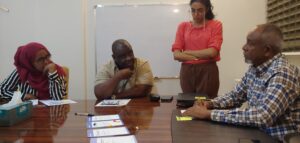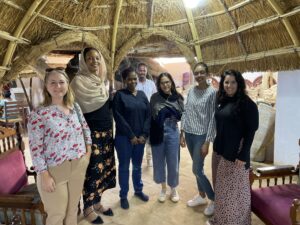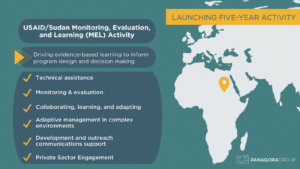Launching Five-Year USAID/Sudan MEL Activity
We are proud to announce the launch of the five-year USAID/Sudan Monitoring, Evaluation, and Learning (MEL) Activity, which Panagora will lead, supported by our partners Sayara International and Weeyacom. Our talented team (nearly all of whom are Sudanese) will work with USAID and other stakeholders to improve performance management at all levels, helping the Mission meet Agency requirements, make evidence-based decisions, and advance a culture of learning across USAID/Sudan and its partners.
MEL for improved development outcomes, working with local partners

At Panagora, we believe that inclusive, sustainable development is driven by bringing together all stakeholders, including local partners and communities, to learn from evidence and drive local solutions to improve development outcomes.
Our MEL work in Sudan will include conducting impact and performance evaluations on USAID activities and designing and implementing surveys, analyses, and assessments to inform program design and provide insights into new or existing development challenges. We will support USAID to implement high-quality, evidence-based programs, and will provide short-term technical assistance through local and international experts. Assistance may cover WASH, health, climate change, renewable energy, education, agriculture, governance, conflict, stabilization, localization, and humanitarian assistance, depending on USAID/Sudan’s shifting needs and demands.
Weaving it together: collaboration, learning, and adapting
Effective development also requires intentional and inclusive learning—that’s why CLA is the foundation of our implementation approach. We will ensure programs are coordinated, grounded in sound knowledge and evidence, and iteratively adapted to remain relevant, especially during times of crisis.

We use a highly participatory model to operationalize the use of CLA and knowledge management within USAID/Sudan throughout the program cycle. This ensures that all staff and stakeholders’ apply a learning lens to their work, using data, lessons learned, and the full range of staff capabilities to design, implement, and improve USAID’s programs in Sudan.
Developing a strong CLA culture and process is key for advancing development solutions. Our learning agenda will focus on deepening coordination and collaboration within the Mission as well as among other donors, local organizations, and other implementing partners. One way we will facilitate this is through a series of CLA sessions, including using CLA in response to crisis.
Supporting development communications
Integral to developing good programs and processes is USAID’s communication and collaboration with local partners and communities. Sudan MEL will support USAID’s outreach and communications in two key ways: 1) helping to share USAID/Sudan’s mission through awareness-raising campaigns and 2) actively identifying and working with local partners to engage them in development work and build their skills in working with USAID. We look forward to partnering with local entities to document stories and testimonials, conduct opinion polls, and produce video documentaries, under the guidance of USAID/Sudan. We will also organize special events such as open houses and roundtables to further interact with stakeholders. This engagement will ultimately strengthen USAID’s work by making it more locally-driven and responsive.
Strengthening private sector engagement
An important element of our capacity building will be providing private sector engagement strategies and analyses of public-private partnership opportunities. Our expert facilitators will support the Mission in engaging with local stakeholders and the private sector to identify innovative local solutions for Sudan’s development challenges. Through public-private partnership assessments, we will work with USAID/Sudan to identify traditional and non-traditional development partners to achieve impactful and sustainable results. We are looking forward to catalyzing local partnerships and continuing to advance locally-led development.

Fostering inclusive development and local partner approaches
As a woman-owned social enterprise working to improve the health and livelihoods of women and families around the world through our work, we are proud to provide support for USAID initiatives that focus on inclusion of marginalized groups to drive development solutions. It is essential to bring these lenses into our monitoring and evaluation tools to ensure we understand the unique experiences of these groups. Panagora is supporting USAID to identify and understand the challenges facing women, youth, and conflict-affected populations, to inform the development of more inclusive programming. We will also advise USAID/Sudan on developing indicators and evaluating the project’s progress on reducing gender gaps, transforming gender norms, and how these factors may improve the wellbeing of women and girls in Sudan. We have done similar work for USAID/India on several inclusive development and gender analyses.
Additionally, we are excited to support the development of USAID/Sudan’s local outreach strategy, assisting the Mission to proactively identify and support new and non-traditional partners, advancing the Agency’s localization initiatives in Sudan.
Adaptive management in a complex environment
Sudan faces many political, economic, climate, and security challenges and is considered a complex environment. As such, the Sudan MEL team is operating under a detailed security framework and is applying adaptive management principles to respond to challenges that arise.
Panagora is a trusted partner to provide agile and adaptive strategies and to deliver sustainable, context-specific solutions and learning. Through our nine MEL platforms around the world, and work during the COVID-19 pandemic and in post-conflict environments, we have become adept at pivoting to ensure continued implementation without disruption, and at helping USAID to adapt to better respond to changing program needs.
Ultimately, Sudan MEL will be driving learning from evidence into action. We will use the novel insights gained from our evaluations and assessments to help inform program design and activity decision making.
